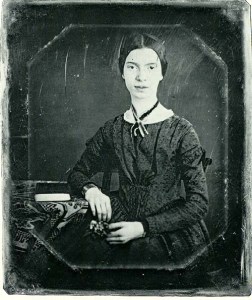By Dr Oliver Tearle
‘I started Early – Took my Dog’ is one of those Emily Dickinson poems that repay careful consideration of not only its literal meaning but the symbolic, other meaning which its images and double meanings appear to gesture towards. The poem requires a bit of close analysis to tease out this other interpretation, however, so here goes…
I started Early – Took my Dog –
And visited the Sea –
The Mermaids in the Basement
Came out to look at me –
And Frigates – in the Upper Floor
Extended Hempen Hands –
Presuming Me to be a Mouse –
Aground – upon the Sands –
But no Man moved Me – till the Tide
Went past my simple Shoe –
And past my Apron – and my Belt
And past my Bodice – too –
And made as He would eat me up –
As wholly as a Dew
Upon a Dandelion’s Sleeve –
And then – I started – too –
And He – He followed – close behind –
I felt His Silver Heel
Upon my Ankle – Then My Shoes
Would overflow with Pearl –
Until We met the Solid Town –
No One He seemed to know –
And bowing – with a Mighty look –
At me – The Sea withdrew –
When is the sea not the sea? When it’s a symbol for sex, of course! Is this what we get here with ‘I started Early – Took my Dog’? The poem begins with words which could almost be a banally literal description of the poem itself: ‘I started’. So the poem starts. There follows an account of this morning stroll (‘I started Early’) which the poem’s  speaker undertook along the beach, until – having presumably waded some way into the water – the tide rises, engulfing more and more of the speaker’s body, until it’s above her waist. She then retreats to the town.
speaker undertook along the beach, until – having presumably waded some way into the water – the tide rises, engulfing more and more of the speaker’s body, until it’s above her waist. She then retreats to the town.
But this might make for a rather unremarkable poem if it weren’t for the symbolic richness of this oceanic encounter. And the poem can be analysed on several levels, the most intriguing of which, perhaps, is that Dickinson is using the sea as a metaphor for the (female) speaker’s sexual awakening. We have already seen this foreshadowed in the phantasmagorical reference to the mermaids, which came out from the basement (the sea’s bed, or the subconscious?) to look at the speaker, suggesting that stage of one’s own sexual maturation when the sexual object is simultaneously other (the mermaids as female symbols of sexuality) and internalised (these mermaids have come to look at the speaker in all her glory).
The juxtaposition of ‘Man’ and ‘Tide’ in the third stanza hint at the poem’s symbolic meaning, inviting us to analyse the sea as a force which – as in a poem by another female American poet, ‘Oread’ by H. D. – is male, overpowering, literally smothering the female speaker as it engulfs her very body:
But no Man moved Me – till the Tide
Went past my simple Shoe –
And past my Apron – and my Belt
And past my Bodice – too –
This creeping possession of the female speaker’s body implies a sexual possession, but also a sexual awakening, as though Dickinson’s speaker is beginning to come to terms with adulthood, with the development of herself as a sexual being:
And made as He would eat me up –
As wholly as a Dew
Upon a Dandelion’s Sleeve –
And then – I started – too –
‘I started’, of course, takes us back to the first two words of the poem. ‘I started Early’: an early developer? Has puberty arrived while the speaker is still a young girl? The end of the poem, where the ‘Solid Town’ forces the sea to back off, invites us to consider the clash, so pronounced in nineteenth-century conservative New England, between the social expectations and mores for young women (embodied by the town as a symbol for civilisation and society) and the boundless freedom and energy of the individual (encoded in the sea). It’s as if the speaker, having come to terms with her own sexuality, has retreated to the safety of society with its norms and rules.
Discover more of Dickinson’s poetry with ‘Because I could not stop for Death‘, ‘My Life had stood – a loaded Gun‘, ‘This World is not Conclusion‘, and ‘My Life closed twice before its Close‘. We’d also recommend her wonderful Complete Poems.
The author of this article, Dr Oliver Tearle, is a literary critic and lecturer in English at Loughborough University. He is the author of, among others, The Secret Library: A Book-Lovers’ Journey Through Curiosities of History and The Great War, The Waste Land and the Modernist Long Poem.


3 thoughts on “A Short Analysis of Emily Dickinson’s ‘I started Early – Took my Dog’”